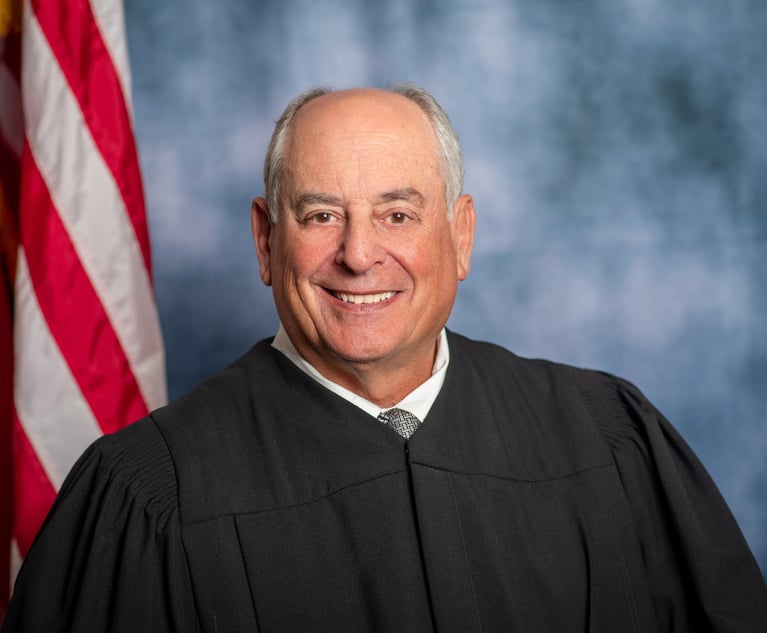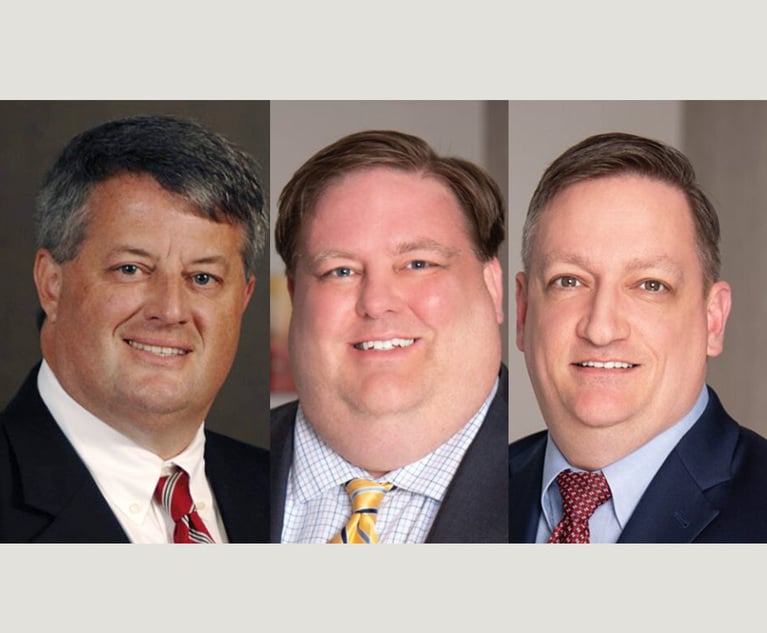 Judge Christian Coomer, Georgia Court of Appeals (Photo: John Disney/ ALM)
Judge Christian Coomer, Georgia Court of Appeals (Photo: John Disney/ ALM)Questions for the Bench: Judge Christian Coomer of the Georgia Court of Appeals
"The most effective way to preserve the Constitution is to ensure all government, including the judiciary, operates within constitutional limits."
May 06, 2019 at 01:57 PM
7 minute read
Gov. Nathan Deal last year tapped Christian Coomer, an eight-year Republican state House member, to fill an opening on the Georgia Court of Appeals. Coomer agreed to be the latest subject of “Questions for the Bench” and provided the following answers.
What prompted you to seek an appointment to the Court of Appeals?
For me, serving on the bench presented a new opportunity to work toward protecting and defending our constitutions. After years of service through military duty, public and private law practice, community volunteerism and membership in the Georgia General Assembly, I had developed a sense of what government overreach looked like, and I had developed a healthy disdain for it. The most effective way to preserve the Constitution is to ensure all government, including the judiciary, operates within constitutional limits. Our constitutions are designed to prevent the government from unnecessarily restricting liberty and unduly burdening free people. Serving on the bench gives me the opportunity to help ensure the constitutional balance between the power of government and the rights of the people is maintained.
Now that you have served in the Legislature and on a court that interprets laws, what do you think lawmakers could do to make sure their intentions are followed in the laws they enact?
The importance of working with really smart lawyers when drafting legislation cannot be overstated. When there is no ambiguity, the courts are bound to follow the plain language of the statutes enacted by the General Assembly. The role of the General Assembly is to create the policies and priorities of the state. The courts step into the role of interpreter only where the Legislature has not given adequate indication of its intent. A significant element of preserving the legislative powers and restricting courts to their basic, constitutional function is drafting laws that are easy to read and understand. Having counsel who can put a legislator's ideas into a clear, coherent bill is invaluable to the legislative process.
What do you like most about being a judge?
The most enjoyable part of being a judge is watching the ideas presented by the legislative branch synthesize with the people. The legislative function is theoretical, even experimental. Legislators identify problems and create what they hope are solutions. Sometimes the solutions are grounded in research and take on an air of the scientific. Nevertheless, even the most reasonable law is just an idea on paper until it meets the unpredictability of human resistance. To paraphrase Field Martial von Moltke, no statutory framework reaches with any certainty beyond the first encounter with the courts.
By contrast to legislation, judicial decisions have real, immediate impacts on the lives of the parties. While judicial opinions also inform the decision-making processes of others who will face similar issues in the future, the outcome of the case at bar is intended to do justice between the parties in litigation. The best part about being a judge is the ability to observe the effects of statutes and, as much as possible, make sure they reach their intended ends.
What keeps you up at night regarding your work?
The greatest tension in an appellate judge's work is resisting the temptation to make things “right” when the law does not support that outcome. Litigators lose sleep to make sure they win their cases. As a judge, I'm working to make sure the law “wins.” Handing down decisions that fit squarely within the bounds of the law makes application of the law predictable for everyone. Predictable results make society function and flow better by reducing the stress of uncertainty. When people know what to expect from the courts, they can make better informed decisions by more accurately measuring risks—they have confidence the rules of aren't going to change while they are pursuing their goals. Good jurists strain to ensure their decisions are grounded in the law and not determined by the prevailing winds of public opinion.
What are your pet peeves in briefs and arguments?
As a person who has worked at least two or three jobs at any given time in my adult life, I'm a very forgiving audience. That said, it is striking to read a document that looks like it was not proofread before it was filed. When a writing is full of typographical, grammatical and spelling errors, it leaves the reader with the impression that the writer didn't think it was very important and, perhaps, should not be taken too seriously.
What U.S. Supreme Court justice who served in the past 20 years would you like to emulate and why?
I want to write opinions that are clear and concise, that don't wander into unnecessary territory and that are helpful to lawyers in predicting what will happen in other cases. A lawyer's greatest skill is the ability to tell the future. When appellate opinions provide clear guidance to attorneys, the attorneys' worth goes up, their clients' confidence in Georgia's judicial system rises, and the outlook for our state's future continues to improve. Justices Clarence Thomas and Neil Gorsuch seem to have hit that mark more frequently than others.
What is your approach to stare decisis? Under what circumstances would you vote to overturn a precedent?
Stare decisis is a part of how we make the law reliable and stable and its application predictable. From time to time, an opinion may be published that is correct in its holding but adds pronouncements that apply more broadly than necessary in the case before the court. The broad language may result in an illogical or untenable result when applied to the facts of another case. In those circumstances it is proper for the contemporary court to scale back the overly broad language and limit the previous holding. Stare decisis should be one guiding principle of judicial decision making, but it must not be the only principle.
Since you have served in the U.S. Air Force, what is the biggest misconception ordinary citizens have about that branch specifically, or military service in general?
I have served on active duty in the Georgia Air National Guard and the U.S. Air Force Reserve. When airmen, soldiers, sailors, marines, and coast guard members are enlisted or commissioned, they take an oath to uphold and defend the Constitution. People who have not served in the military may not know that a U.S. military member's first obligation of loyalty is to the Constitution—not the piece of paper, but the ideals it embodies. Military members are required to obey lawful orders, but they do not swear allegiance to a person or a party. They give up part of their liberties, and sometimes even their lives, in service to the Constitution.
Reserve Citizen Airmen are members of each community; they are teachers in our schools, first responders in fire and police departments, local business owners, and public servants. Georgians are living and working beside military reservists every day.
Whether military members are active duty or serve in a reserve component, whether they serve in a land, sea, air, space, or cyber force, they are working together to bring a unified fight to the enemies of our Constitution. In that sense, they are in league with every person who is working to advance the principles of the Constitution—prosecutors and defense attorneys, trial and appellate judges, public officials, and private citizens of every stripe.
|This content has been archived. It is available through our partners, LexisNexis® and Bloomberg Law.
To view this content, please continue to their sites.
Not a Lexis Subscriber?
Subscribe Now
Not a Bloomberg Law Subscriber?
Subscribe Now
NOT FOR REPRINT
© 2024 ALM Global, LLC, All Rights Reserved. Request academic re-use from www.copyright.com. All other uses, submit a request to [email protected]. For more information visit Asset & Logo Licensing.
You Might Like
View All
'A 58-Year-Old Engine That Needs an Overhaul': Judge Wants Traffic Law Amended
3 minute read
Fulton Jury Returns Defense Verdict After Pedestrian Killed by MARTA Bus
8 minute read
'The Best Strategy': $795K Resolution Reached in Federal COVID-Accommodation Dispute
8 minute read
Population and Caseload Boom Birth New West Georgia Judicial Circuit
7 minute readTrending Stories
Who Got The Work
Michael G. Bongiorno, Andrew Scott Dulberg and Elizabeth E. Driscoll from Wilmer Cutler Pickering Hale and Dorr have stepped in to represent Symbotic Inc., an A.I.-enabled technology platform that focuses on increasing supply chain efficiency, and other defendants in a pending shareholder derivative lawsuit. The case, filed Oct. 2 in Massachusetts District Court by the Brown Law Firm on behalf of Stephen Austen, accuses certain officers and directors of misleading investors in regard to Symbotic's potential for margin growth by failing to disclose that the company was not equipped to timely deploy its systems or manage expenses through project delays. The case, assigned to U.S. District Judge Nathaniel M. Gorton, is 1:24-cv-12522, Austen v. Cohen et al.
Who Got The Work
Edmund Polubinski and Marie Killmond of Davis Polk & Wardwell have entered appearances for data platform software development company MongoDB and other defendants in a pending shareholder derivative lawsuit. The action, filed Oct. 7 in New York Southern District Court by the Brown Law Firm, accuses the company's directors and/or officers of falsely expressing confidence in the company’s restructuring of its sales incentive plan and downplaying the severity of decreases in its upfront commitments. The case is 1:24-cv-07594, Roy v. Ittycheria et al.
Who Got The Work
Amy O. Bruchs and Kurt F. Ellison of Michael Best & Friedrich have entered appearances for Epic Systems Corp. in a pending employment discrimination lawsuit. The suit was filed Sept. 7 in Wisconsin Western District Court by Levine Eisberner LLC and Siri & Glimstad on behalf of a project manager who claims that he was wrongfully terminated after applying for a religious exemption to the defendant's COVID-19 vaccine mandate. The case, assigned to U.S. Magistrate Judge Anita Marie Boor, is 3:24-cv-00630, Secker, Nathan v. Epic Systems Corporation.
Who Got The Work
David X. Sullivan, Thomas J. Finn and Gregory A. Hall from McCarter & English have entered appearances for Sunrun Installation Services in a pending civil rights lawsuit. The complaint was filed Sept. 4 in Connecticut District Court by attorney Robert M. Berke on behalf of former employee George Edward Steins, who was arrested and charged with employing an unregistered home improvement salesperson. The complaint alleges that had Sunrun informed the Connecticut Department of Consumer Protection that the plaintiff's employment had ended in 2017 and that he no longer held Sunrun's home improvement contractor license, he would not have been hit with charges, which were dismissed in May 2024. The case, assigned to U.S. District Judge Jeffrey A. Meyer, is 3:24-cv-01423, Steins v. Sunrun, Inc. et al.
Who Got The Work
Greenberg Traurig shareholder Joshua L. Raskin has entered an appearance for boohoo.com UK Ltd. in a pending patent infringement lawsuit. The suit, filed Sept. 3 in Texas Eastern District Court by Rozier Hardt McDonough on behalf of Alto Dynamics, asserts five patents related to an online shopping platform. The case, assigned to U.S. District Judge Rodney Gilstrap, is 2:24-cv-00719, Alto Dynamics, LLC v. boohoo.com UK Limited.
Featured Firms
Law Offices of Gary Martin Hays & Associates, P.C.
(470) 294-1674
Law Offices of Mark E. Salomone
(857) 444-6468
Smith & Hassler
(713) 739-1250






